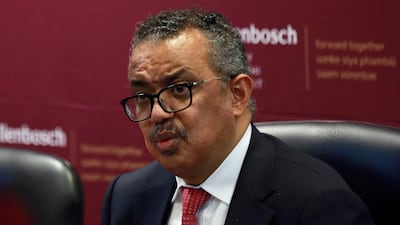The director general of the World Health Organisation said on Friday the acute phase of the pandemic could end this year, if about 70 per cent of the world's population is vaccinated.
"Our expectation is that the acute phase of this pandemic will end this year, of course with one condition, the 70 per cent vaccination [target is achieved] by mid this year around June, July," Tedros Adhanom Ghebreyesus, told reporters in South Africa.
"If that is to be done, the acute phase can really end, and that is what we are expecting. It's in our hands. It's not a matter of chance. It's a matter of choice."
He was speaking during a visit to Afrigen Biologics and Vaccines, which has produced the first mRNA Covid vaccine made in Africa using Moderna's sequence.
"We expect this vaccine to be more suited to the contexts in which it will be used, with fewer storage constraints and at a lower price," Dr Tedros said.
The vaccine will be ready for clinical trials in November, with approval expected in 2024.
Afrigen is leading the pilot project, backed by the WHO and the Covax initiative.
Set up in July, the tech transfer hub will train other countries and hand out production licences to poor nations left out in the race for the life-saving shots.
Dr Tedros said WHO was "committed to supporting the development of local manufacturing in Africa and around the world, to increase regional health security".

Just over 11 per cent of Africans are vaccinated, the lowest rate in the world. Last week the WHO's Africa office said the continent must boost its vaccination rate "six times" to reach the 70 per cent target.
The world panicked late last year following the outbreak of the highly contagious Omicron variant which led at its peak to four times more daily infections than previous waves.
Meryame Kitir, Belgium's Minister of Development Co-operation, who was part of the team visiting the Cape Town, bemoaned the slow progress in talks seeking a waiver on vaccine patents.
"Vaccines should be a public good, but after two years in the pandemic ... we are not a step ahead," in patent negotiations, she said.
South Africa and India have since October 2020 led calls for waivers on vaccine patents, or intellectual property rights, on Covid-19 vaccines saying this would help spur local production.
But a number of wealthy countries hosting large pharmaceutical companies have opposed the move, which believe that would discourage innovation.
World Trade Organisation, however, announced last month that an accord between rich nations and developing countries on the intellectual property rights waivers could be just weeks away.

